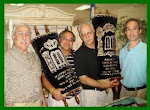
The most valuable asset of any community is its people. If there is a single word that describes what is most valuable among a community’s people it is "harmony". If there is harmony within a community, the community shares its resources and its values. In adversity, the community pulls together, in good times they celebrate together. At all times, as individuals look out for their personal needs, they must also give due attention to the good of the greater community. The better community institutions meet the needs of the people, the better the institutions will be supported in return, and the stronger those institutions will be.
By and large, this is true of the Charleston Jewish community. In fact, something recognized as unique to Charleston is the level of respect and cooperation that exists between the three denominations / congregations - Conservative, Orthodox and Reform. In particular, this has been exemplified and maintained by the conduct of the community’s three rabbis over many years. The three shuls, and their members, participate in, and are served by, the "shared" institutions of Jewish Charleston - the JCC, the Federation, and AHA, the community day school.
Nothing, of course, is perfect. Difficulties and disagreements will arise from time-to-time.
To limit the negative effects of such matters, the process of dealing with them must be open, and fair. The implementation of democratic processes must be logical, and be based on identifiable values. That is why we have constituions, rules and bylaws, and institutional mission statements.
Finally, we must ensure the health of our democratic processes by evaluating and dealing with these issues honestly and openly, so that the leadership bases its decisions upon the collective wisdom and desires of the members the community at large. That is not just their undeniable responsibility, but larger groups have been shown to make better decisions in the long run, than small cardres of experts or people with special interests.
For this brief discussion, I wish to deal with the matter of "conflict/s of interest". I will probably ask more questions than provide specific answers, and the reader will finally have to make up his / her own mind on these issues.
I present this material for individuals and / or groups to review and discuss. I believe that if we exercise our minds, and consider these issues, we can evaluate better what is being done in our institutions on an ongoing basis. By doing so, we will be better able to maintain the health our institutions and our community.
_______________________
Consider these questions:
If one is serving on a committee and an issue comes up that affects one personally, in some way that places one’s interest in the issue at odds with the general interests of the institution one is supposed to be serving,
a) is it acceptable for one to place one’s personal needs above those of the organization one is supposed to be serving?
b) must one withdraw from participation, or can one participate provided one clarifies one’s position/s?
c) if no-one else present knows that the matter affects one in some way, does one have an obligation to declare one’s "conflict of interest"?
Repeat this question with the following options:
a few know, but most don’t;
most know but a few don’t;
all present know, but in the larger organization there are many who do not.
______________________________
There are many acceptable options that may apply in such settings. The following lists some examples:
1 A chairman may let some-one else run the meeting for the discussion of a matter in which the chairman has an actual or perceived "conflict of interest".
2 One may declare one’s conflict, and continue to participate or withdraw from participation, whichever appears to be appropriate.
3 One may abstain from voting on the issue.
_____________________________
Such issues will vary depending on the specific details of each case, and for many situations, if not most, reaching a consensus on what is appropriate should not be difficult.
Here are some additional scenarios.
During a committee discussion, a participant takes a position that is clearly based entirely on his / her self-interest over the larger group-interest. What should be done? by the person chairing the meeting, or by others if the chairman does not act?
a) nothing
b) the chairman should remind everyone on the committee of their duty to the group / mission / organization
c) if the chairman does nothing, someone else should
d) the person should be approached outside the meeting and be advised of the inappropriateness of his / her actions or position.
e) the general discussion of the issue/s should clarify why the individual’s position is inappropriate in that setting.
Again, one can see, that various options may apply.
For there to be harmony, proceedings must be open and fair, and these issues must be kept consistent - a balance that encourages participation, but discourages inappropriate actions.
Dealing with such issues may require some sensitivity. It will certainly be easier to manage if at the outset of conducting business on a new committee, or a newly installed board, the chairman reminded all participants of their responsibilities. Where appropriate, members should recieve copies of mission statements, rules and bye-laws. Some institutions hold board retreats to orient their participants.
In conclusion - there are many ways to achieve these standards. The goal should be for us to apply the same standards of conduct to our participation in Jewish community organizations as we do in our professional lives, and in our coduct of civic affairs in the wider community.



No comments:
Post a Comment